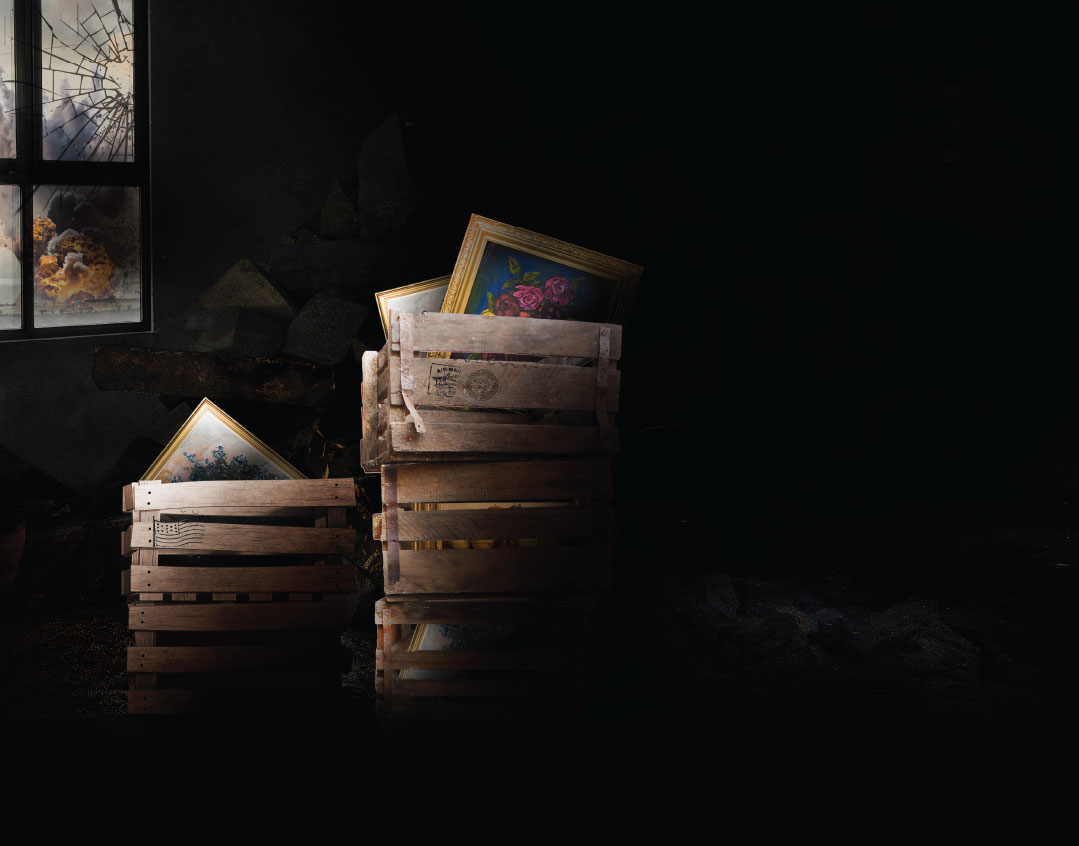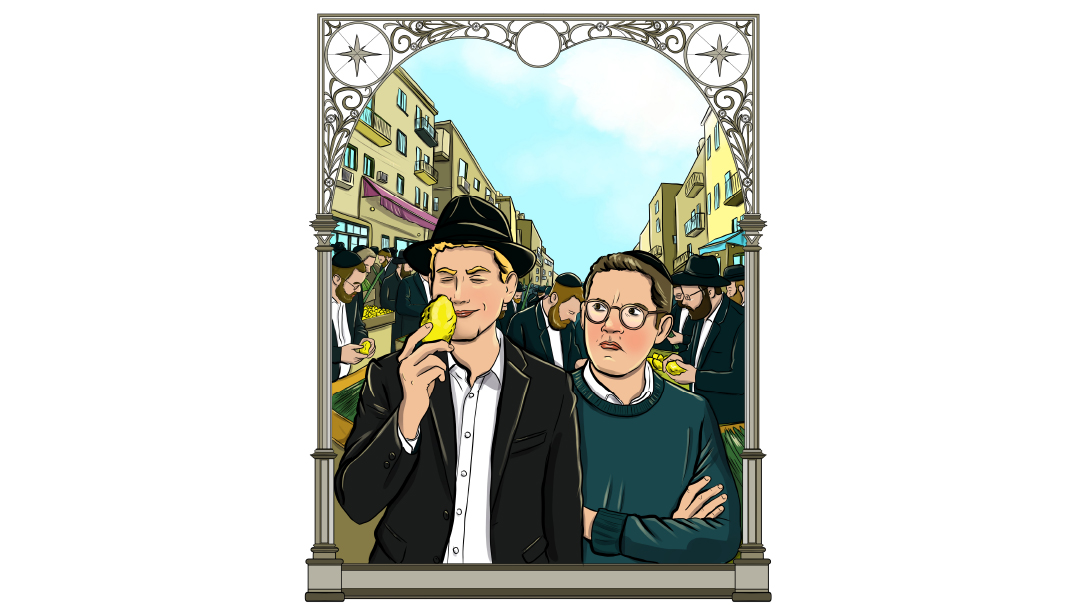Moe’s Search for Treasure

May 1945

I
t was over.
The madman — no, not a madman, the descendant and inheritor of Amalek — the monster who’d plunged an entire planet into chaos, was dead. Rumors had been flying as fast as bullets storming out of a machine gun: Hitler was captured, he’d been hanged, he’d killed himself, the Germans were attacking, the Germans were retreating, the Germans had surrendered…
Now, it appeared, at least one rumor was true. On May 8th, Lieutenant Moses Freed joined the others in his division to hear the announcement: Yesterday, the Germans surrendered unconditionally to our forces. The war in the European theater is over.
A roar burst out of hundreds of throats. These were throats that had known hunger and thirst during battle, that had screamed in pain under a hail of bullets. Some of these throats had tightened with unshed tears when an army buddy died in a comrade’s arms. These long-suffering throats now roared and shrieked and screamed in joy.
It was over.
But it wasn’t.
The German High Command might have surrendered, but there were still nests of snipers to be cleaned out, and renegade SS members desperate to go into hiding and willing to kill anyone in their way. The country was a roiling mass of refugees, death camp survivors, Nazi prisoners, Allied soldiers, all on the move.
Moe spent his days in this hotbed of explosive anarchy, using his knowledge of German to interrogate Nazi prisoners of war. In the little spare time he had, he dreamed about returning to a peaceful civilian life. It wouldn’t happen soon; more likely, he’d be shipped out to some tiny island off Japan.
But as it turned out, the US Army didn’t need Lieutenant Freed in the Far East. His next posting was a lot closer to where he was stationed — and something he’d never expected.
If I survive this war and have a son, Moe thought wryly, what will I say when he asks, “Daddy, what did you do in the big war?”
“Well, son, I did something I’m not allowed to tell you about, but it was kind of like that game we play called Scrabble. No guns, just ABCs. And then Daddy talked to a lot of bad guys in their bad guy language. And then...”
“And then,” Moe rolled his eyes, “your daddy went hunting for pretty pictures.”
Well, not quite as bad as that, but almost.
He reviewed the conversation he’d just had with his commanding officer; actually, as of now, his former CO.
“Well, Lieutenant, looks like we’re losing you to Seventh Army.”
“Sorry to be leaving, sir,” he said. He was being polite — truth was, though he liked the men in his outfit, interrogating prisoners could get really tedious.
Moe had spent most of the war in England, code-breaking, and he’d only been in combat under fire for one night, more than enough to satisfy his longing for action. After spending two searing days in liberated Mauthausen, he really wanted to be posted in a place where he could be of use to his fellow Jews, finally free but still suffering.
“We’re sending you to the MFAA.”
“Sir?”
“Monuments, Fine Arts, and Archives section. Have you ever heard of it?”
“No, sir.”
The CO grinned. “Neither did I, until today. It seems there’s a group of officers and enlisted men attached to different divisions. Their current mission is to find and secure important works of art that have been looted by the Nazis. You were chosen for your excellent German and your background in intelligence. Pack up your gear, you’ll be shipping out to Austria at 1900 hours. Beautiful country, and you’ll be right there in the Alps.”
Beautiful country. Nest of anti-Semites. Birthplace of Hitler, yemach shemo v’zichro. Mauthausen was in Austria; Moe still had nightmares from what he’d seen there, days after its liberation.
And now he was going to Austria to find pretty pictures.
A black shadow walked swiftly through the darkness of a Prague night. The city, captured by the Russians just days before, was still under war conditions. No lights were permitted, a blessing for a fugitive.
He had killed many. Now others wanted to kill him.
And he did not want to be killed.
He walked through the darkness, looking for the shelter of a greedy man.
Colonel Harris looked over this new lieutenant they’d sent him and scanned his service files. Bright boy, obviously, spoke many languages, had done some work in England, so hush-hush it didn’t even appear in his records.
“Know anything about art, Freed?”
“Not too much. I took a class in high school.”
The colonel had an impish grin. “Then you know nothing at all.”
Moe returned the smile. His last CO had been decent but stiff, like a man who’d been ironed with too much starch. This officer seemed more likable.
He ventured a joke. “Not much art going on in Coney Island, sir. I could recognize the Mona Lisa, I guess.”
“That’s one painting we don’t have to save. The Louvre shipped her out and kept that beautiful lady safe before the Nazis could grab her.” The smile faded into seriousness. “Adolf Hitler was not only a murderer, Lieutenant, he was a thief. Perhaps the worst thief in history. He loved art, and he stole, or tried to steal, all of Europe’s treasures. Van Gogh, da Vinci, Rembrandt — all those artists your high school teacher bored you with. The greatest treasures of all time, and they’re all hidden away somewhere. It’s our job to find them.”
In the Freed Hotel, Annie sat in the parlor, savoring her brother Moe’s weekly letter.
It’s been two weeks since I joined MFAA. The work is interesting and I’m beginning to think it’s important too. I’ve been paired with Second Lieutenant Parker Jones. It’s nuts. I outrank him, but he’s about 20 years older than me, and a famous artist and sculptor and also a professor in Harvard — imagine, Harvard! — and he knows so much more than I do about most everything. Raphael, Vermeer, Michelangelo — I’m learning a lot.
Annie tried to picture her brother as a man of culture and art, smiled at the image, and continued to read.
We’re traveling through the Austrian Alps, following up leads. The Nazis took thousands, probably tens of thousands, of artistic treasures. It’s our job to find them.
I’ve also sort of become a “rabbi” here. I’m the only one in the area who has a kosher pair of tefillin, and the word has gotten out. People keep drifting in, Jewish survivors (nebach, most of them half-starved, I give them whatever I have left from your food packages) and Jewish soldiers. They put on my tefillin, kiss my siddur. Sometimes I even share a vort with them.
Now that was more like her Moey! Annie’s face lit up with pride: Her brother had never missed a day of putting on tefillin, not even in Pearl Harbor after the attack or when he was stuck in the Battle of the Bulge. None of this art nonsense…
Got to go now. Love, Moey
A knock at a darkened house. A door pulled open cautiously.
A few whispered words.
Gold. And the promise of more gold to come.
Two black shadows walked toward a dark structure next to the house. They entered. Minutes later, only one shadow slipped out.
The other had found a greedy man.
Moe hadn’t enjoyed army life so much since he’d left England. There were about 400 “Monuments Men,” as the members of the MFAA were called. Most were artists, sculptors, architects, museum curators; very different from the officers and men he’d met at the front, and even from the brilliant mathematicians he’d worked with in England.
This area, nestled in the gorgeous Austrian Alps, had been a favorite vacation spot for high-ranking Nazis. Lieutenants Freed and Jones spent their days moving through breathtaking scenery, searching magnificent villas, peeking into coal bins and dusty attics for looted paintings and sculptures. They came upon a Degas painting of a dancer stashed in a vault hidden behind a fireplace. A coal cellar yielded a box of gold ingots — some Nazi official’s insurance policy, no doubt.
Lieutenant Jones was nicknamed “the Prof,” and in the hours he spent with him, Moe saw why. The man was an outstanding teacher of art. During their time together the Prof shared a new world with Moe: the world of perspective, of light and shadow, of hues and shading and brushwork and the Old Masters. In high school, they’d called it “art appreciation,” but here, in this gorgeous and blood-soaked country, Moe was gaining a real appreciation for the beauty of man’s creations.
One afternoon, after a long morning following up on a lead that had come to nothing, they stopped to relax just off the road. Below them they could see an Alpine lake, the massive mountains reflected in its aqua waters.
Moe stared, entranced by the beauty. He murmured a few words.
“What’s that you said, Moe?” the Prof asked.
“Just some Hebrew. From a prayer we say every day. Mah rabu maasecha Hashem.”
“Meaning?”
“Just thanking G-d for His amazing world.”
“Good for you, Moe. It’s good to believe in something. But tell me — don’t you think your G-d would like you to celebrate His handiwork?”
Moe pulled his gaze off the lake. “What does that mean?”
“You’re one smart young man,” the professor said. “I’ll bet you were a top student.”
Moe reddened. “Well, yes, I did pretty well.”
“You’ve got brains, Moe, but you also have something else. I’ve been watching you these past couple of weeks. You have an artist’s eye. You see beneath the beautiful exterior to the essence of things; one day, you might be able to capture that essence on canvas or in marble. Maybe it’s your Talmud training, or maybe it’s just a gift. But you could, you should, learn more about art, and find your place in its world.” He paused. “Let’s get this job done, and get back home. Call me, and I’ll see to it that you’ll get accepted into my school.”
Moe stiffened. “You mean… Harvard?”
“That’s exactly what I mean. You’re too smart for Coney Island. I can make it happen, Moe.”
Moe had already found out that the Prof was a top teacher, revered in academic circles. He wasn’t bragging when he said he could make it happen.
The question was: Did Moe want him to?
No matter how tired he was, Moe never relaxed after his day’s searching. The “Rabbi Lieutenant,” as his fellow officers called him, had his “congregation” to take care of: the weary Jews who’d walked miles to take advantage of his tefillin.
Today, with thoughts of Ivy League colleges whirling in his brain (For Heaven’s sakes, FDR himself was a Harvard grad!) Moe had trouble concentrating. His “kehillah” was small, he saw gratefully, and he’d have time to think about the Prof’s unexpected offer. There were only two soldiers and one old man lined up for the privilege of putting on tefillin.
The soldiers happily wrapped the tefillin, thanked Moe, and hurried back to their duties. Moe turned to the old man. His cheekbones were jutting cliffs of bone, his eyes sunken hollows. Looking at his emaciated frame, still covered by a ragged, poorly fitting striped uniform, Moe felt a wave of emotion that combined pity, revulsion, and burning hatred for the Germans who’d done this to the man before him, to his entire people.
“Vus ken ich teen fahr eyr, what can I do for you?” he said gently.
The man pointed a shaky hand at the tefillin. Moe suppressed a shudder as he helped him wrap the straps over frail, scarred arms, then led the old man to a chair and served him a steaming cup of tea.
The tea and, even more, the tefillin, seemed to strengthen him, and he finally spoke. His name was Berel Grossbaum. He’d been a yeshivah student in Poland when the war began.
“A yeshivah student?”
A ghost of a smiled played on the man’s lips. “How old do you think I am?”
“Um…” Moe hesitated.
Berel took pity on his obvious discomfort. “Ich bin finive-tvantzig.”
All other emotions disappeared under an overwhelming wave of sorrow. This old man was 25 years old.
Moe’s age.
Blinking back tears, Moe bent over to hear Berel better. His hands suddenly grabbed at Moe like claws. “Come to the Rav,” he whispered.
There was a rabbi, it seemed, lying sick in a field hospital near Mauthausen. He’d heard about this Amerikanishe soldier with tefillin, and he wanted to speak with him.
It was getting late. Moe was tired. He had letters to write, and a whole new possible future to think about. Mauthausen was over an hour away.
But a rabbi, a survivor of these horrors, wanted to see him.
The letters, even his future, would have to wait.
It was hot, airless, in this tiny, hidden room in the barn. Crowded, too. When he’d asked the greedy man to take out the stacks of boxes and make more room for him, that dog had just laughed and refused outright.
He still needed him to bring him food and water once a day. But in a day or two, when his arrangements were finalized, he’d no longer need that money-loving beast.
He caressed the small revolver holstered next to his heart.
It was late when Moe returned home, but he headed straight to the villa where his CO was billeted. He found the CO sitting at a large desk, taking care of paperwork.
“Request permission to travel, sir,” Moe said, standing at rigid attention.
“At ease, Moe. Take a chair.” He pointed to a fine antique with delicate lacework arms. “What’s going on?”
Moe told him about Berel, and about the rav he’d just met in the field hospital. “He’s dying, sir. The doctors don’t think he’ll make it. He’s only about 40, but he looks ancient. He told me some of the things he’d gone through….” Here Moe paused, his face pale. “Unspeakable.”
The CO’s lips tightened. He’d read the reports of what the liberating soldiers had been finding.
“He’s terribly weak, sir, but completely lucid. He told me he’d been the rabbi of a small congregation near the outskirts of Prague. When the Nazis came, all the Torah scrolls and other Jewish artifacts were rounded up, supposedly to protect them. He didn’t believe the Nazis, and he took everything out of the synagogue and hid it all away in Prague. There was a Torah scroll there that belonged to his great-grandfather, silver ornaments, holy books. Now all he wants before he dies is to see that Torah, kiss it.” Moe’s voice shook slightly. “He wants to kiss it goodbye.”
The CO sat quietly for a few minutes. “Moe, finding Jewish artifacts is not in our orders. There are other squads looking out for them.”
Moe’s voice was quiet but urgent. “We’re looking for cultural treasures. These are treasures too, Jewish treasures. That rabbi, sir — he’s going to die soon.”
The CO glanced at Moe’s flushed face and then down at his desk, at still another report of Nazi atrocities.
“Okay, Lieutenant, I’ll approve your request. We’ve got a supplies truck going out to Prague tomorrow at 0800 hours, you can hitch a ride with it. Be back in one week. Oh, and Moe,” he added, as his junior officer gave him a crisp salute and a grateful smile, “take your arms with you. Still a lot of Nazis out there.”
It was a bumpy, three-hour ride to Prague, with a taciturn driver, so Moe had plenty of time to think, to dream.
Harvard. A degree from the country’s most respected university would open doors that had always been slammed shut before a Jewish boy from Coney Island.
But if doors were opening, others would close.
For four long years in the army he’d lived as a Torah Jew, but only in snatched minutes. Minutes to pray by himself, before reveille. Minutes to read a few pesukim in the parshah or a line or two in his Gemara. His posting in England had been Hashem’s gift: He’d been able to keep Shabbos and Yom Tov, and he’d even had kosher food. But since arriving on the continent he’d barely been able to observe the mitzvos properly. A full Torah life needed other Torah Jews; in Harvard, he’d be all by himself once again.
And what about his resolution, made after his short visit to Mauthausen, that he’d be there for those who’d survived Gehinnom on earth?
In Harvard, there would be no survivors.
The kilometers passed; Moe dreamed.
The truck driver left him at a small village on the outskirts of the city. Prague had been liberated by Soviet troops just a few weeks earlier. Though they were allies, Moe had no desire to get stopped by a Russian officer asking embarrassing questions.
The rav had given him detailed instructions. The farmhouse was about five kilometers from the junction. Moe felt conspicuous walking in his GI uniform, but he soon relaxed; this was a quiet time of day, the roads were empty.
He reached the farmhouse toward dusk. He found an abandoned hut in a field and decided to wait there until night, when the farmer was asleep. The rav had paid the man well to hide the sefer Torah and the other objects. “We promised to pay him more at the end of the war,” he’d told Moe, “if they were still safe. He is a greedy man,” the rav had added, “and I believe he’ll keep his word, so he can get the money.” Still, it would be easier to go into the barn and take the Torah now, without meeting the farmer. Later, someone could bring back the remaining objects and pay off the debt.
Finally, the long, boring wait ended. The fields and farmhouse were now enveloped in darkness.
Moving quietly, Moe reached the large, weather-beaten barn. There was a wooden scaffold that ran the length of the building’s interior, reached by a ladder that was piled up high with hay. Pushing aside the hay from the right wall beneath the eaves would reveal a hairline crack, almost invisible unless someone was looking for it. Push the crack in — and it opened into a tiny room.
Taking a few seconds to accustom his eyes to the darkness, Moe pushed the crack in.
The fugitive slept lightly, his chest bare, one hand next to the holstered revolver. The door to the garret was well-oiled, but his ears, attuned to the slightest sound of danger, heard a tiny creak. He was upright just as the figure came through the trapdoor.
It was not the greedy farmer.
The fugitive pulled at his holster.
Private Moses Freed had gotten his sharpshooter badge in basic training, impressing his superior officers with his accurate marksmanship. But in four years of war he’d never had the need to draw his gun.
Now the time had come.
The two shots rang out as one.
Unlike his opponent, whose eyes were still dim with sleep, Moe’s vision was clear.
He hit the man directly in the chest, just as his own arm seemed to catch fire.
Four years before, in a drunken fight with an anti-Semitic soldier, Private Freed had frozen with fear. War had changed him. Holding a flashlight in his bloody arm, he calmly bent over the figure on the floor.
Dead.
And what was that on the man’s bare arm? There they were, the letters AB tattooed on the underside of his left arm. Moe’s officers’ manual had clearly told him what that meant: Most SS officers had their blood type tattooed in that spot.
Despite the pain, he smiled in triumph, then calmly assessed the situation. He was in the Soviet zone, his arm was bleeding badly, he had a dead body in front of him, and a stack of boxes that had to be opened so he could find the sefer Torah.
He needed help. He knew where he could find it.
Surprisingly, the journey back was quicker than the ride to Prague. The farmer, terrified that Moe would either shoot him or give him over to the Soviet authorities for having sheltered a Nazi, was very cooperative when Moe banged at his door. He bandaged his wound and helped Moe open the boxes and slip out a blanket-covered sefer Torah.
“What do we do with the body?” the farmer asked. “We can’t leave it here, or I’ll be in big trouble.”
Moe pondered the problem. If they brought in the Soviets, the Czech farmer would be arrested, possibly executed, for harboring a fugitive. He was greedy, but he’d kept his promise to the rav of the shul, and had helped Moe. Besides, if Moe got involved with the Russian Army bureaucracy, there’d be a long delay. The rav needed this Torah now.
“Wrap it in a sheet and put it in the back of your truck,” he told the man.
Driving through a zone occupied by Communists, with a dead Nazi, a bloody GI, and a sefer Torah in the back, was a dangerous business. Luckily, the farmer knew all the back routes, and they were not stopped as they sped toward the American zone.
With the adrenaline still coursing through his body combining with the stabs of agony from his wound, Moe couldn’t shut his eyes, though he’d been up most of the night. Thoughts and images flashed through his mind. Harvard’s Ivy League campus. A stuffy little shul in Coney Island. A beautiful Degas painting. A sefer Torah, hidden away while the world around it exploded.
“We’re here in the American zone. Where do you want to go?”
Moe needed to get back to his CO and start explaining the corpse. He needed to get his wound bandaged. He needed some sleep.
But first, he needed to do something else.
“Take me to the field hospital near Mauthausen.”
“Welcome back, Moe,” the Prof said. “How’s the arm?”
Moe grinned. “It hurts more from the paperwork than from the bullet.”
“You’re a lucky man. You dodge a bullet, catch a wanted SS Nazi, and come back with a Letter of Commendation. Harvard is going to seem very tame after all this.”
Moe grew serious. “I’ve been meaning to tell you this, Prof. I appreciate the offer, but I’ve decided not to accept it.”
The Prof raised a surprised eyebrow. “You’re sure of that, Moe? It’s a great opportunity.”
Moe thought of the small levayah he’d attended the week before, and of the sefer Torah that the rav had expressly requested be given to him. The last time Moe had seen him, days before his death, the rav had told him why. “Yiddishkeit here is gone. Take the Torah back with you, Moishe Baruch, take it and use it and teach others to use it too.”
And that was exactly what Moe Freed was going to do.
This story is based on characters appearing in Freefall, a novel originally serialized in Family First, now appearing in book form. Freefall: From Brooklyn to Normandy — an epic saga of a family in turmoil is published by Shaar Press / ArtScroll.
Non-spoiler alert: If you didn’t follow Freefall, this story gives the background needed to understand it, but doesn’t reveal any of the plot’s secrets.
(Originally featured in Family First, Issue 636)
Oops! We could not locate your form.













